The Sony KDL37W5500 LCD TV shares exactly the same design, connectivity, user menu, EPG and infrared remote control as its recently tested brethren the KDL40W5500 (please look up the relevant sections if necessary), so this review will instead focus on its calibration potential and picture performance.
<!-- google_ad_client = 'pub-2887677957235196'; google_ad_slot = '4990177225'; google_ad_width = 336; google_ad_height = 280; //-->
Note: The specific model we tested was the Sony KDL37W5500U (which denotes the 3-pin-plug United Kingdom version), but the terms KDL37W5500, KDL-37W5500 and KDL37W5500U may be used interchangeably throughout this article to refer to the same LCD television.
Just like on the KDL40W5500, engaging the [Cinema] / [Theatre] mode on the Sony KDL37W5500 – with its default [Colour Temperature] setting of “Warm 2” – yielded a greyscale which came closest to D65 industry standard:
 |
| Pre-calibration CCT with [Cinema] mode & “Warm 2” [Colour Temperature] |
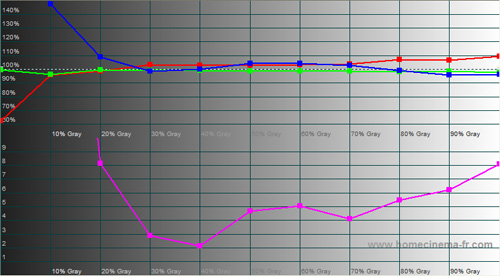 |
| Pre-calibration RGB tracking & delta errors |
The blue channel on the Sony KDL37W5500 did not track as well as that on the KDL40W5500, exhibiting a bump around 50-60% stimulus and then a dip after 70% stimulus. Even after tweaking the values in the [White Balance] submenu, we could not fully rectify this blue channel inconsistency:
 |
| CCT after greyscale calibration in [Cinema] mode |
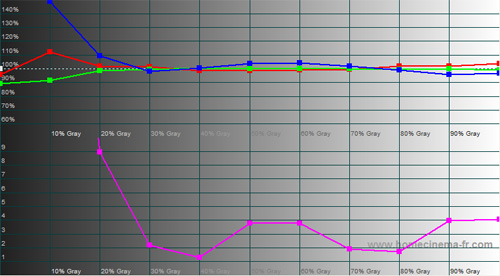 |
| RGB tracking and delta errors (dEs) after greyscale calibration |
In other words, the calibrated greyscale on the Sony KDL37W5500 HDTV did not track as well as that on the KDL40W5500, likely due to a difference in the LCD panel used. Nevertheless, from 30% stimulus onwards delta errors (dEs) did not go much higher than 4, which is good enough for all practical purposes.
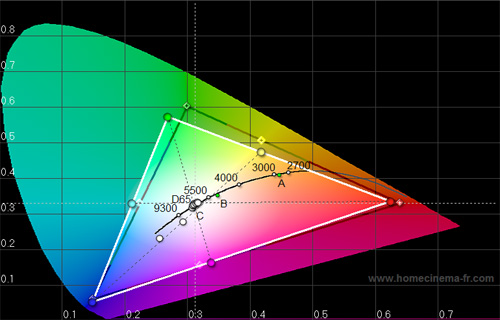 |
| Post-calibration CIE chart with reference to HD Rec. 709 |
With a green primary that was tilted towards blue, an undersaturated red which was partially compensated by mild red push, and slightly off magenta (and yellow) secondary colour points, colour gamut on the Sony KDL37W5500 was similar to – though marginally more constricted than – that on the KDL40W5500. Engaging [Live Colour] would over-exaggerate the colour intensities/ brightness globally, so we advise leaving it off for critical viewing.
| Dead pixels | None |
| Screen uniformity | Excellent |
| Overscanning on HDMI | 0% with [Display Area] set to “Full Pixel“ |
| Blacker than black | Passed |
| Black level | Very good (0.09 cd/m2 calibrated) |
| Black level retention | Stable in [Cinema] / [Theatre] mode |
| Primary chromaticities | Green primary tilted towards blue |
| Scaling | Very good |
| Video mode deinterlacing | Average; limited jaggies reduction |
| Film mode deinterlacing | Passed 3:2 cadence in 480i; and 2:2 in 576i |
| Viewing angle | 100° |
| Motion resolution | [Motionflow] “Standard” and “High“: 600; “Off”: 300 |
| Digital noise reduction | Acceptable at baseline |
| Sharpness | Defeatable edge enhancement |
| 1080p/24 capability (PS3) | Accepts 1080p/24 video signal; no telecine judder |
| Input lag (rel. to Samsung F96) | 21ms in [Game Mode]; 42-67ms otherwise |
| Default “Standard” [Picture Mode] | 141 watts |
| Calibrated [Cinema]/[Theatre] mode | 90 watts |
| Standby | 15 watts with [Quick Start] engaged; <1 watt otherwise |
Even out of the box, we immediately noticed that the Sony KDL37W5500 exhibited better screen/ backlight uniformity than that on the KDL40W5500. After calibration, not a wisp of clouding nor backlight bleeding was seen in sight.
Calibrated black level on the Sony KDL37W5500 was 0.09 cd/m2. While this figure does not seem as good as the 0.05 cd/m2 measured on the KDL40W5500, in real-life side-by-side comparison the difference was subtle rather than stark… the Sony KDL37W5500 LCD television still managed to muster sufficiently convincing blacks to convey depth and realism beyond what lesser competitors could hope to achieve.
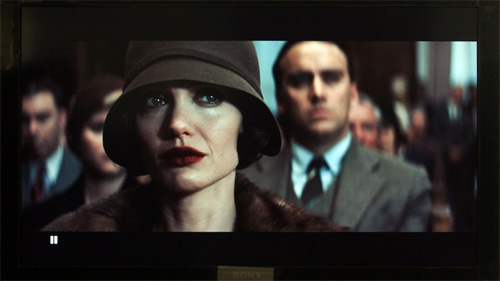
Armed with near-D65 greyscale post-calibration, colours – including skin tones – looked the part, though the slightly compressed colour gamut (not to mention the lighter shade of black) did shave a bit off the vibrancy.
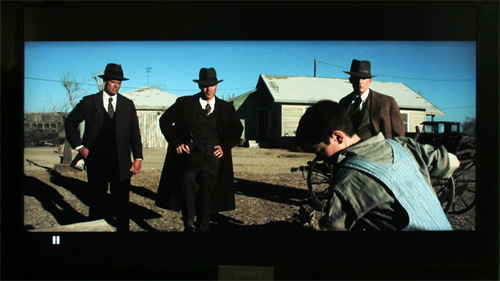
In [Cinema]/ [Theatre] mode, point gamma hovered around the 2.2 ideal throughout, imparting a realistic rise from dark to bright to the picture, complemented by revealing shadow detail and punchy image contrast that was extremely pleasing to the eye. As expected, high-definition detail extraction and presentation was impeccable once [Display Area] was set to “Full Pixel” to achieve 1:1 pixel mapping.
Similar to the KDL40W5500, standard-definition video processing was very impressive on the Sony KDL37W5500. Standard-def upconversion/ upscaling appeared sharp and detailed without introducing excessive ringing, and 2:2 pulldown was performed competently to eradicate line twitter and moire from film-based content such as movies and American dramas. The only small blemish remained the rather average video-mode deinterlacing, which led to a few more jagged edges than we would like to see in video-based material.
With [Game Mode] engaged via the [Scene Select] submenu, input lag on the Sony KDL37W5500 was measured to be 21ms slower than our resident Samsung F96 reference. While the resultant gaming response did feel a touch heavier than the near-lagless experience we so enjoyed on the retired Bravia W4000/ W4500 series, whether or not this amount of input lag will affect your gaming performance depends on your individual sensitivity, and the reflexes demanded by the particular game.
Delivering sufficient audio resolution and dialogue clarity to satisfy your everyday needs, the sonical performance of the Sony KDL37W5500 was comfortably ahead of that of its closest competitors (Samsung and Panasonic), but again still a half-step behind the benchmark set by the W4000/ W4500 series due to a relative paucity of bass extension.
It’s not surprising to find that the overall picture quality of the Sony KDL37W5500 HDTV was very close to the KDL40W5500, though the difference in LCD panel types used may have contributed to a slightly lighter shade of black, and less compliant greyscale tracking. Nevertheless, if you’re in the market for a 37-inch LCD television, you’ll be hard-pressed to find a better set given its commendable black-level performance, circa-2.2 gamma, exquisite high-definition detail, and highly competent SD upscaling and film mode deinterlacing.

<!-- google_ad_client = 'pub-2887677957235196'; google_ad_slot = '0693194791'; google_ad_width = 336; google_ad_height = 280; //-->